Section 3: LITHUANIA TODAY
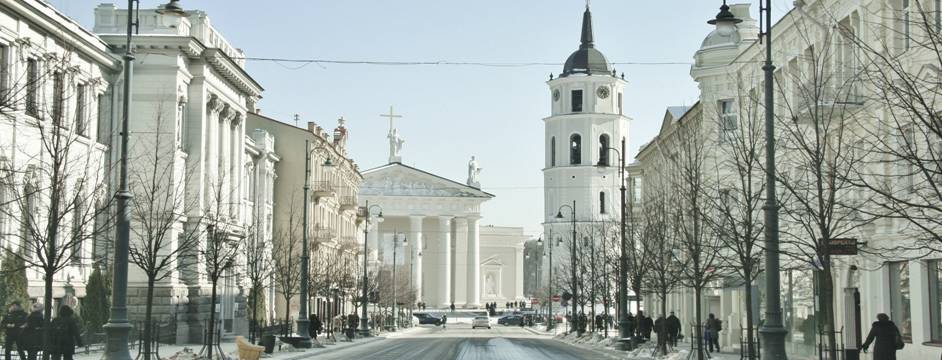

THE VOICE OF INTERNATIONAL LITHUANIA
|
VilNews has its own Google archive! Type a word in the above search box to find any article.
You can also follow us on Facebook. We have two different pages. Click to open and join.
|
Thu, 31st December, 2015 - (7) Comment
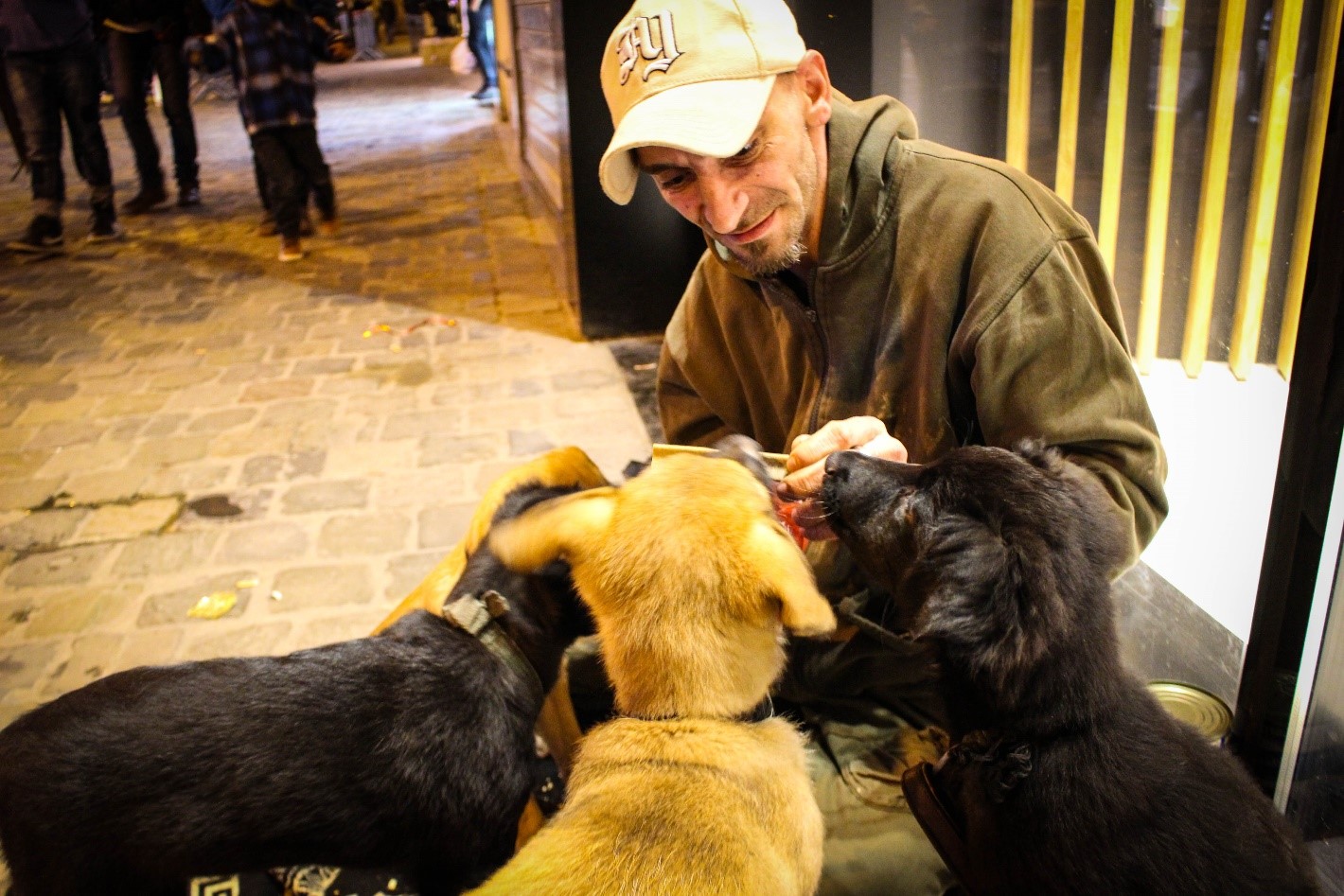
By Rugilė Šablinskaitė
Brussels – Belgium
...It's a time for giving, a time for getting,
A time for forgiving and for forgetting.
Christmas is love, Christmas is peace,
A time for hating and fighting to cease’…
sings Cliff Richard.
I guess everyone knows this cliché Christmas song as well as many more others that talk about this special time of the year when everyone becomes just a little bit better, a little bit more understanding, more giving, less angry. Oh, and we shouldn’t forget about the so called Christmas miracle. So many ads and campaigns shouting: ‘Help someone have their Christmas miracle’.
Thu, 31st December, 2015 - (14) Comment

Text: Saulene Valskyte
In Lithuania Christmas Eve is a family event and the New Year’s Eve a great party with friends!
Fri, 30th October, 2015 - (0) Comment
The professors who showed
Lithuania the path to its future
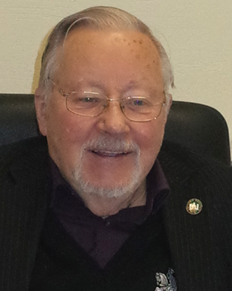

PROFESSOR VYTAUTAS LANDSBERGIS – PROFESSOR IRENA VEISAITE
Journalist: Dalia Cidzikaite
Photographer: Patrick Murphy
Questions prepared by Aage Myhre
A few days ago we sat down with two of Lithuania's most famous professors for a so-called double interview. We wish in the future to run similar double interviews here in VilNews; with leading Lithuanians in politics, economics, culture, science and so on. Simply because we think this may give you, dear readers, new insights and knowledge about the persons and also about historical and contemporary Lithuania.
Professor Vytautas Landsbergis and Professor Irena Veisaite were both born in Lithuania’s interwar capital Kaunas around 1930 – she a Jew who miraculously survived Holocaust, he a genetic Lithuanian who came to lead Lithuania’s revolution against the Soviet occupiers 25 years ago.
The interview with the professors will be published in our next edition of VilNews.…
Fri, 30th October, 2015 - (0) Comment
Fearful of Russia, Lithuanian
volunteers sign up fearing
a repeat of Ukraine

MEMBERS OF THE LITHUANIAN RIFLEMEN’S ASSOCIATION ON A WEEKEND EXERCISE
Finishing his working week as a lawyer, Robert Juodka puts on his fatigues, loads his assault rifles into the car and heads off to the woods to take part in training. He and his comrades regard their “war games” as deadly serious; preparations for resisting a Russian invasion.
The Lithuanian Riflemen’s Union, which was disbanded by the country’s communist government, now has 10,000 members. New recruits join every week. The age range is wide, but a hard nucleus is being formed of former service personnel. And experienced foreign volunteers may be admitted in the future. Many fear that what has happened to Ukraine may be revisited in Lithuania.
THIS IS FROM AN ARTICLE IN THE BRITISH NEWSPAPER “INDEPENDENCE”.
Read the full article here: http://www.independent.co.uk/news/world/europe/fearful-of-russia-lithuanian-volunteers-sign-up-fearing-a-repeat-of-ukraine-10126321.html…
Fri, 30th October, 2015 - (0) Comment
All Saints’ Day in Lithuania

PHOTO: WWW.LIETUVA.LT
November 1st, people of the Christian Faith all over the world celebrate All Saints’ Day. In
While in modern times, this day involves visits to cemeteries to decorate graves, attending Church and get
Read more at https://vilnews.com/2011-01-all-saints-day
Fri, 5th July, 2013 - (10) Comment
|
|
|
|
|
|
By Kestutis Eidukonis
In my travels and musings about Lithuania and Lithuanians it has become quite clear to me that there is no such entity as a single Lithuania anymore. Any serious writing or treatment of the subject matter has to recognize this reality.
The singular Lithuania my parents knew and described to me no longer exists. Lithuania has been transformed into at least three different and distinct entities. Each with its own good and bad characteristics. When I discuss Lithuania with friends and relatives it is like the blind men describing the elephant. Depending on who you talk to. Lithuania is either beautiful, hopeful or beyond redemption.
Fri, 28th June, 2013 - (1) Comment
|
Lithuania will hold the Presidency of the Council of the European Union in the second half of 2013, starting from the 1st of July. VilNews has on this background asked readers to annotate and analyze factors that have to do with Europe, the EU, the euro and Lithuania. This is one of the posts we have received. An article by Dr. Rimas Slavickas |
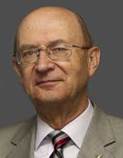 Dr. Rimas Slavickas |
It is an honour for such a small country like Lithuania to fulfill the role of EU Presidency. By accepting this responsibility to diligently fulfill this task may further enhance EU’s unity to be as ‘one’, yet retaining the strengths, resiliencies and differences of autonomous ‘individual nations’ with their own respective historical identities. Lithuania has an opportunity, during its tenure, to raise the European bar – standards, even higher by setting examples for others to follow. The further pursuance of practical ideals and solutions which include government and economic stability, wrapped in democratic principles of justice, freedom of expression and human rights would provide even a greater global attention and exposure for both EU and Lithuania. Namely, by setting aside human frailties of individual self serving political esteem and associated benefits and thereby provide a perception of greater national unity and strong leadership to further enhance the positive moral direction by affectively addressing European challenges. Such efforts would be globally recognized that integrity, sincerity, goodwill and determination of purpose, even from a relatively small nation, can achieve much. This attribute is especially relevant to Lithuania which historically has seen many years of political turmoil, world wars and more than half a century of suppressed occupation and yet has retained its rich cultural heritage, religious beliefs and basic democratic principles. Such national determination initiated the ending of the official Soviet system and today stands out to others as an example of perseverance and that ‘it ‘can be done’, irrespective of the magnitude of the perceived challenge.
Therefore, let the Lithuanian decision makers brace themselves to this privileged task and recognize that this tenure is not only a challenge but also an opportunity to help both the EU concept and also the Lithuanian nation. The strengthening of the idealistic concepts of European Union would also enhance Lithuania’s global credibility and fundamental concepts of national unity abroad and at home.
Sat, 20th April, 2013 - (3) Comment
Until recently, Vilnius was often called Europe's best kept secret. Very few knew that here lies one of the world's best-preserved cultural treasures, namely Eastern Europe’s largest and most attractive old town. Few knew that Vilnius is considered the world's most Italian city outside Italy and the world’ most Baroque city north of the Alps. This is now changing rapidly. The world population has become aware of both the city and the country and the number of travelers here is the sharp increase.
Vilnius is the city Lonely Planet colourfully calls "eccentric and soulful," and one that offers the best overall hotel prices in all of Europe. According to Hotels.com's Hotel Price Index, Vilnius in Lithuania has an average per-night hotel price of $80, putting accommodations costs within reach of budget travelers. Sweeten the pot with a favorable exchange rate, quirky attractions, and Eastern Europe's largest old town, and you've got an intriguing and affordable destination.
Here are some recent articles:
| Vilnius – Baltic beauty |
|
| Vilnius: The cleanest air in Europe |
|
 |
Lithuania among “The World’s Ten Best Ethical Destinations – 2013” |
 |
Vilnius is one of Europe’s most affordable cities for 2013 |
Thu, 4th April, 2013 - (1) Comment

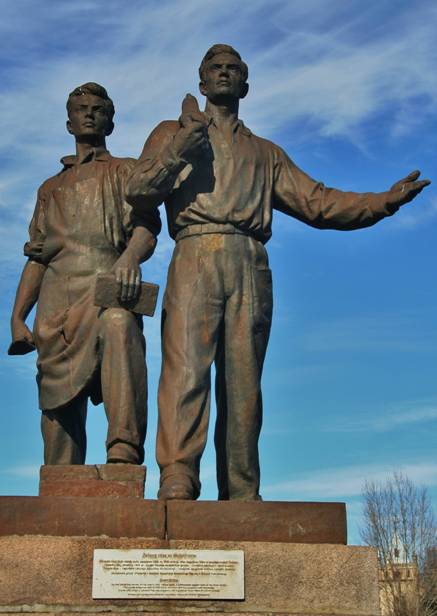
The Green Bridge sculpture "Industry and Construction (Pramonė ir statyba)" by Bronius Vyšniauskas and Napoleonas Petrulis.
Photos: Aage Myhre.
The Green Bridge (Lithuanian: Žaliasis tiltas) is a bridge over the Neris River in Vilnius, Lithuania. It is the oldest bridge in the city and connects city centre with the so-called right river bank and the Kalvariju g that leads to several of the city’s Soviet suburbs north of the city centre.
The first bridge is known from 1536. It stood closer to the present-day Mindaugas Bridge. It was a wooden covered bridge with brick and stone piers. It had a second floor with apartments for toll collectors. Because its builder Ulryk Hozjusz wanted to recoup the cost by collecting tolls, Grand Duke Sigismund I granted him a privilege prohibiting others to build any other bridges between Kernavė and Bistrica or to offer other crossing services between Verkiai and Paneriai. The bridge was burned by retreating Lithuanian Army after the Battle of Vilnius (1655).
Thu, 4th April, 2013 - (1) Comment
“Let's do it” by Cole Porter
From the Show: Paris 1928
Birds do it, bees do it
Even educated fleas do it
Let's do it, let's fall in love
In Spain, the best upper sets do it
Lithuanians and Letts do it
Let's do it, let's fall in love
Fri, 29th March, 2013 - (0) Comment
By Vin Karnila, Associate Editor
Thinking about Lithuanian Easter traditions transforms me back in time to when I was a young boy growing up in the Boston area of Massachusetts, USA. Being the son of a Scottish mother and Lithuanian father I had the great fortune of experiencing the wonderful traditions of not only the Lithuanian people but that of the Highland Scott‘s as well.
While along with the Lithuanian Christmas traditions we practiced many of the Scottish customs for Christmas and New Year as well but Easter is seemed was a time for the traditions of our Lithuanian ancestors. These were the traditions the Karnila family took with them from our ancestral home in Lithuania, the village of Guronys.
Fri, 29th March, 2013 - (2) Comment
The word for Easter, Velykos, has been borrowed from Byelorussian and means "important day." The word is very accurate because Easter is the year's most solemn feast in Lithuania. Easter is not only the feast of Christ's Resurrection, but also nature's awakening from the winter's sleep.
The early Eastern morn, just before dawn, abounds with magical power. Much of this magic is concentrated in flowing water. Bathing in such water before sunrise prevents all boils, sores, rashes and other skin ailments. If it rains on Easter morning, it is necessary to stand bareheaded in the rain to ensure good growth. Small children who want to grow quickly are reminded of this.
As the sun rises on Easter morning, it "dances" swaying from side to side and changing colour: from green to blue, to red and then golden yellow. This phenomenon can be seen by rising before dawn and watching for the sun's first appearance on the horizon.
Tue, 19th March, 2013 - (3) Comment

By Dr. Stasys Bačkaitis, P.E, CPSM
Board Member of the Central and Eastern European Coalition
Washington Representative of the Lithuanian American Council
Political and social stability of the Central and Eastern European (CEE) region is being slowly eroded by dangerous undertows. They tend to undermine the confidence and trust of the people in their governments and in the European Union (EU). The undertows, originating mostly in Russia, are sowing seeds of political, economic, energy and ethnic discontent as a way of gaining influence in and dominance over the countries that were once controlled by the USSR.
But history doesn’t have to repeat itself, say scholars, government officials, and foreign affairs analysts from a whole host of European and NATO countries.
Fri, 15th March, 2013 - (0) Comment
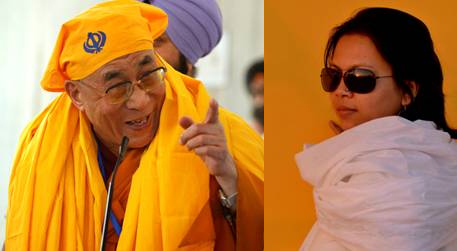
Madhurkankana Roy about her meeting with Dalai Lama in Delhi last Sunday:
There was immense positivity felt in the room. His graceful presence ushered in happiness, a smile on everyone’s face. Awestruck by his presence, the energy generated was beyond comprehension.
|
My good friend in New Delhi, India, Madhurkankana Roy, told me with excitement last Sunday that she had met the Dalai Lama that same day and had been holding his hands not once but twice. His Holiness had come to India to participate in the celebration of Swami Vivekananda*, the Indian Hindu monk who was the key figure in the introduction of Indian philosophies of Vedanta and Yoga to the western world more than 100 years ago. I asked her to write down her thoughts and feelings after the meeting, so here they are, her warm and sensitive considerations after her encounter with the world’s spiritual leader ... Read more about Swami Vivekananda at http://en.wikipedia.org/wiki/Swami_Vivekananda |
“Smile Legacy”
By Madhurkankana Roy. New Delhi, India
The legacy of Swami Vivekananda is relevant to India at a time when the Indian society in particular and world at large is redefining itself to changing times and becoming more just and equitable.
Commemorating 150th birth anniversary celebrations of Swami Vivekananda, the Indian Council for Cultural Relations had organised for an interfaith conference titled 'One World Religions: Diversity, Not Dissension’ to understand the essence of religious faiths and how ‘Religion should be a weapon for self-transformation as well as transformation of the society’ in this age of religious animosities.
Tue, 12th March, 2013 - (1) Comment

VIC Meeting Wednesday 13 March at 18:00
Place: Vilnius Jewish Library, Gedimino 24-9
Speaker: MP Dr. Arvydas Anušauskas
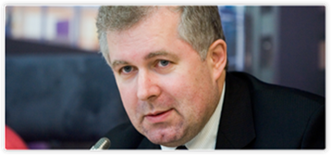
The KGB – the intelligence service of the Soviet Union – was dismantled in October 1991. Ever since, each publication of a new document – lists of reservists or KGB agents, or testimonies on the activity of Soviet agents – by the Genocide and Resistance Research Centre in Lithuania provokes a flood of reactions: the centre’s website (www.genocid.lt) very quickly freezes up under the heavy traffic of visitors…
Sun, 10th March, 2013 - (5) Comment
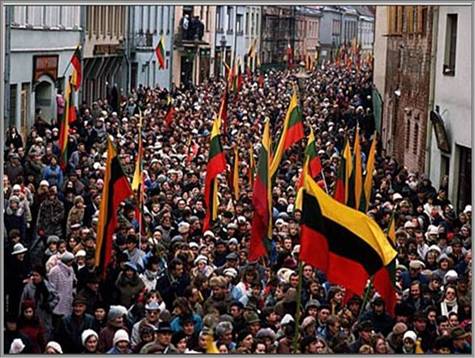
Lithuanians rejoice over their newfound independence, 11 March 1990.
Here from Pilies Street in Vilnius Old Town.
By Aage Myhre, Editor in Chief
aage.myhre@VilNews.com
11 March 1990 is one of the most important days in Lithuanian history. It was on this day 23 years ago that the Lithuanian parliament declared renewed freedom and independence for Lithuania, after the country had been occupied by the Soviet Union since World War II. 124 Parliament delegates voted for the declaration, while six were absent.
In that same session, the Parliament elected Professor Vytautas Landsbergis, the leader of the liberation movement Sajūdis, as Parliament President. He won over the Communist Party leader Algirdas Brazauskas with a 91 to 38 vote.
11 March 1990 became a milestone in Lithuania's history because the Lithuanian politicians that day clearly demonstrated the country’s willingness to again become free and independent. Although it took another 18 months before the international community approved the nation’s independence from the Soviet occupying power, it was the 11 March actions that made it clear to the world that Lithuania no longer accepted to be incorporated into a system and a Commonwealth it had been involuntarily incorporated into when the World War II drew to an end.
11 March 1990 was in many ways the day when Lithuania’s new freedom began, and we must believe that this country now will remain free and sovereign forever, based on democratic principles and values corresponding to those having been developing in Western Europe after World War II ended in 1945.
I can very well imagine that many of the 1990 politicians signed the declaration act with trembling pens. They knew what power they challenged, and were fully aware of what reprisals they and the people they represented could expect from the big bear in the east. The Soviet Union was not a superpower to tease or irritate, and they knew that they would not be treated with kid gloves if the bear decided to strike back, reacting to the severance requirement they signed that day.
But they signed. They were brave. Without their signatures on the document shown below, it is quite possible that Lithuania, Latvia and Estonia still today would be unfree republics under the 'protective' bear paws.
Lithuania’s independence declarations of 1918 and 1990 were both signed by wise and courageous political leaders who did not want to accept that their beloved homeland should remain occupied.
They deserve our respect and gratitude!
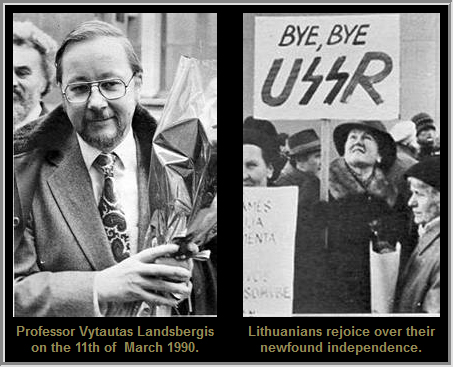
VilNews e-magazine is published in Vilnius, Lithuania. Editor-in-Chief: Mr. Aage Myhre. Inquires to the editors: editor@VilNews.com.
Code of Ethics: See Section 2 – about VilNews. VilNews is not responsible for content on external links/web pages.
HOW TO ADVERTISE IN VILNEWS.
All content is copyrighted © 2011. UAB ‘VilNews’.